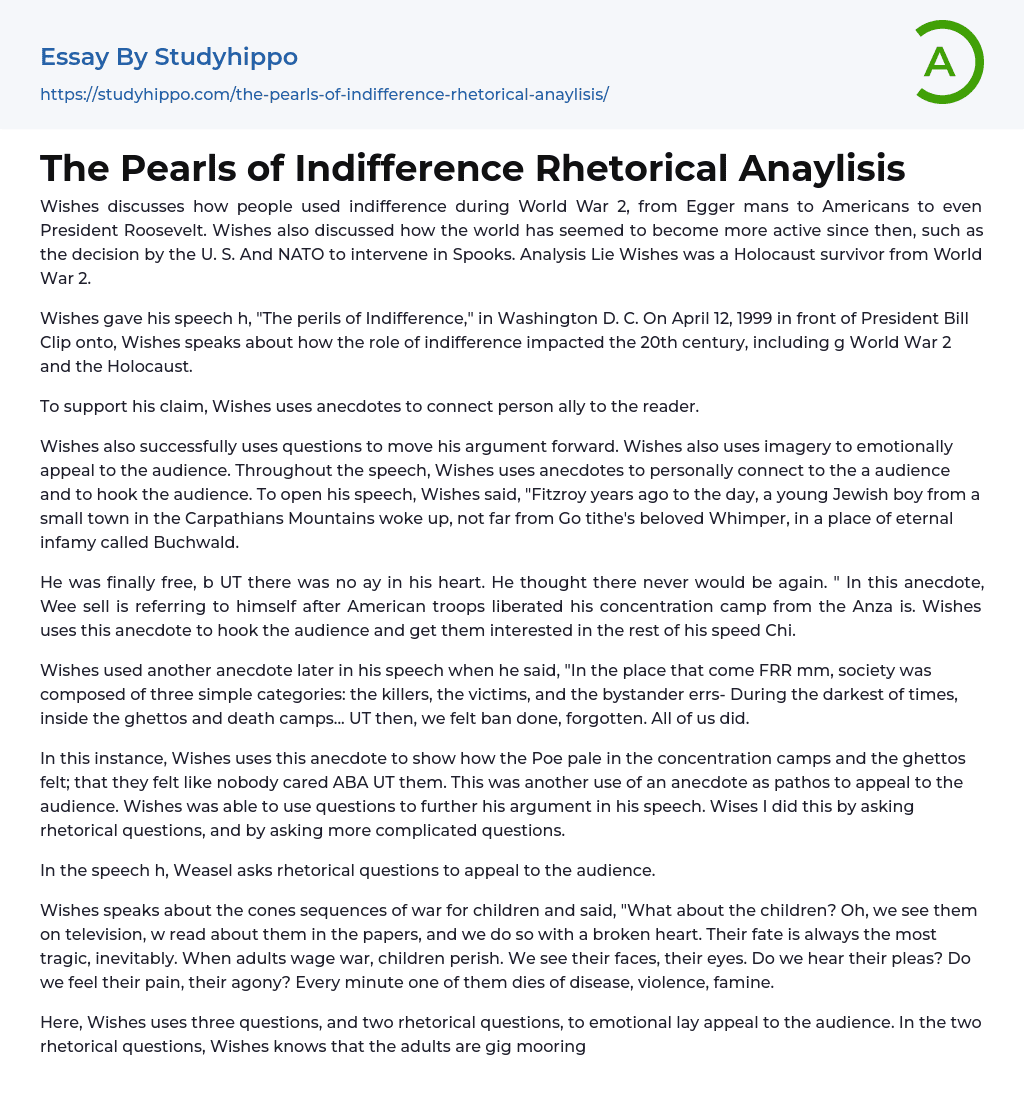

The Pearls of Indifference Rhetorical Anaylisis Essay Example
Wishes discusses how people used indifference during World War 2, from Egger mans to Americans to even President Roosevelt. Wishes also discussed how the world has seemed to become more active since then, such as the decision by the U. S. And NATO to intervene in Spooks. Analysis Lie Wishes was a Holocaust survivor from World War 2.
Wishes gave his speech h, "The perils of Indifference," in Washington D. C. On April 12, 1999 in front of President Bill Clip onto, Wishes speaks about how the role of indifference impacted the 20th century, including g World War 2 and the Holocaust.
To support his claim, Wishes uses anecdotes to connect person ally to the reader.
Wishes also successfully uses questions to move his argument forward. Wishes also uses imagery to emotionally
...appeal to the audience. Throughout the speech, Wishes uses anecdotes to personally connect to the a audience and to hook the audience. To open his speech, Wishes said, "Fitzroy years ago to the day, a young Jewish boy from a small town in the Carpathians Mountains woke up, not far from Go tithe's beloved Whimper, in a place of eternal infamy called Buchwald.
He was finally free, b UT there was no ay in his heart. He thought there never would be again. " In this anecdote, Wee sell is referring to himself after American troops liberated his concentration camp from the Anza is. Wishes uses this anecdote to hook the audience and get them interested in the rest of his speed Chi.
Wishes used another anecdote later in his speech when he said, "In the place that come FRR mm, society was composed o
three simple categories: the killers, the victims, and the bystander errs- During the darkest of times, inside the ghettos and death camps... UT then, we felt ban done, forgotten. All of us did.
In this instance, Wishes uses this anecdote to show how the Poe pale in the concentration camps and the ghettos felt; that they felt like nobody cared ABA UT them. This was another use of an anecdote as pathos to appeal to the audience. Wishes was able to use questions to further his argument in his speech. Wises I did this by asking rhetorical questions, and by asking more complicated questions.
In the speech h, Weasel asks rhetorical questions to appeal to the audience.
Wishes speaks about the cones sequences of war for children and said, "What about the children? Oh, we see them on television, w read about them in the papers, and we do so with a broken heart. Their fate is always the most tragic, inevitably. When adults wage war, children perish. We see their faces, their eyes. Do we hear their pleas? Do we feel their pain, their agony? Every minute one of them dies of disease, violence, famine.
Here, Wishes uses three questions, and two rhetorical questions, to emotional lay appeal to the audience. In the two rhetorical questions, Wishes knows that the adults are gig mooring the children when he asks the question, but they make his argument stronger by asking the SSE questions because they have a deeper meaning behind them. In the speech, Wishes also asks deeper, more complicated questions that leave the audience wondering what the answer is. In his speech, Wishes talks about how President
Roosevelt did not allow the boat the SST.
Lou s onboard Jews into the U.S. In his speech, Wishes said, "The depressing tale of the SST. Louis is a case in point. Sixty years ago, its human cargo nearly 1,000 Jews was turned back to Nazi G remarry. And that happened after the Circumstantial, after the first state sponsored pogrom, tit hundreds of Jewish shops destroyed, synagogues burned, thousands of people put in con nitration camps. And that ship, which was already in the shores of the United States, was sent back.
I don't understand.
Roosevelt was a good man, With a heart. He understood those w ho needed help. Why didn't he allow these refugees to disembark? A thousand people in Amen Rica, the great country, the greatest democracy, the most generous of all new nations in MO deer history.
What happened? I don't understand. Why the indifference, on the highest level, to t he suffering of the stricter Wishes asks three questions in this paragraph to get the audience HTH inking about why Roosevelt showed indifference.
- Anne Frank essays
- Torah essays
- Antisemitism essays
- Black History Month essays
- Black Lives Matter essays
- I Have a Dream essays
- Ku Klux Klan essays
- Malcolm X essays
- Martin Luther King essays
- Miscegenation essays
- Racial Inequality essays
- Racial Segregation essays
- Adolf Hitler essays
- Concentration Camps essays
- Elie Wiesel essays
- Holocaust essays
- Nazi Party essays
- Weimar Republic essays
- Afterlife essays
- Atheism essays
- Bible essays
- Buddhism essays
- Christian Worldview essays
- Christianity essays
- Confession essays
- Cosmological Argument essays
- Deism essays
- Devil essays
- Existence of God essays
- Faith essays
- Freedom Of Religion essays
- God essays
- Hinduism essays
- Immortality essays
- Islam essays
- Jainism essays
- Jews essays
- Judaism essays
- Miracle essays
- Monk essays
- Monotheism essays
- New Testament essays
- Old Testament essays
- Pilgrimage essays
- Puritans essays
- Revelation essays
- Ritual essays
- Salvation essays
- Sin essays
- Sinners essays



